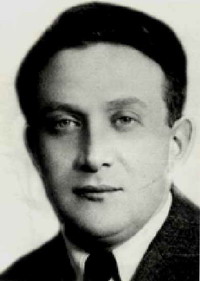Shpiegelglas, Sergei Mikhailovich (1897-1940)

Sergei Mikhailovich Shpiegelglas
An officer of the Soviet OGPU-NKVD foreign intelligence (INO) and Major of State Security (GB).
Shpiegelglas came from an accountant’s family in the Jewish shtetl of Mosty, in the Grodnenskaya gubernia of the Russian Empire. He graduated from school in Warsaw and studied law at Moscow University. He was fluent in Polish, German and French, took part in the revolutionary movement and was arrested by the police. In May 1917, while a third-year student, Shpiegelglas was drafted into the army and, after graduating from an officer school in Petrograd (the name of the Russian capital beginning in 1915), served in the 42nd Reserve Regiment. In January 1919, Shpiegelglas began his service with the Red Army military counterintelligence, then known as the “Military Control.” When it was brought under the roof of the Cheka, he became head of the financial division of the Cheka’s Special Department. He also took part in suppressing counterrevolutionary revolts and investigating espionage cases.
In 1922 Shpiegelglas was sent on a special mission to Mongolia, where he took part in subverting White Guard armed groups operating in that country. He also obtained information on the situation in Mongolia and the strategic plans of the Japanese. Returning to Moscow, he went to work at OGPU foreign intelligence (INO) and, in June 1935, became an assistant to the head of the INO. He was sent on special missions to China and Europe. For instance, he ran an “illegal” intelligence network in Paris, under the cover of an owner of a fish store. In December 1937, he supervised the kidnapping of the White general E.K. Miller and took part in active measures against the Ukrainian Nationalist Organization. He also supervised the obtaining of secret materials of the German General Staff which disclosed German military policy towards the USSR. During the Spanish Civil War, Shpiegelglas supervised the raids of the “flying squads” behind the lines of Franco’s troops, as well as the assassination of Ignacii Reiss in September 1937.
After the death of Abram Slutsky, the head of foreign intelligence, in February 1938, Shpiegelglas was acting head of the INO for several months. He also taught at the NKVD intelligence school. But on November 2, 1938, he was arrested and sentenced to death for “treason, participation in conspiracy, espionage and contacts with the enemies of the people.” Executed on January 29, 1940, he was rehabilitated in 1956. 1
- Vadim Abramov, Evrei v KGB. Palachi i zhertvy. Moskva: “Jauza”/“EKSMO,” 2005, ss. 334-336. (Jews in the KGB: Executioners and Victims, by Vadim Abramov. Moscow: “Yauza”/”EKSMO,” 2005, pp. 334-336. ↩

